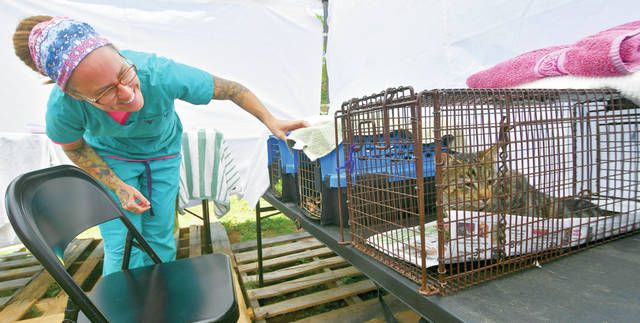
Bare Bones Spays and Neuters
Having worked in an animal shelter for seven years after graduating, Dr. Katie Spaulding was used to not having the most up-to-date equipment on hand to treat her patients.
Then she accepted a position in Hawaii with Animal Balance, a global, non-governmental organization that provides spays and neuters throughout the world.
The working conditions she found on the Island of Kauai was a little more extreme than she was used to as the Dakin Humane Society’s Adoption Center veterinarian in Springfield, Massachusetts.
“I’ve always worked in a shelter so I’ve never had access to a lot of fancy equipment,” Spaulding said, “but this was bare bones.
“It was a little nerve wracking at first because I was used to having walls in the surgical suite.”
In Kauai, Spaulding was doing field surgeries in all sorts of locales including an old car dealership and parking lots. A half shipping container (just 16 feet long) was outfitted as a semi-permanent spay/neuter clinic serving all cats on Kauai. Pop-up tents were used for induction and recovery, prompting Spaulding to say she was “basically working outside.”
Spaulding said there is a huge need for spays and neuters in Kauai because of the feral cat population, estimated at 20,000 just on that island.
“The feral cat population is a big problem in Hawaii, particularly in Kauai,” she said. “The cats prey on the bird population here and these clinics have a goal of reducing the number of cats with a high volume of spays and neuters.”
And talk about high volume. Spaulding says she and her partner were able to do 40 spays and neuters a day and thousands over the life of the program. At each of these clinics, Spaulding and her partner were the only trained professionals and they relied on volunteers to help staff the clinic.
Animal Balance moves into an area to help with spays and neuters for a short period of time. While that organization is now gone, Spaulding has remained on Kauai and has started her own non-profit, AnimalohA to provide accessible veterinary care to underserved Hawaiian island communities.
“I’ve always liked making a difference,” Spaulding said. “That’s why shelter medicine made so much sense for me to focus on.”
AnimalohA was just getting underway when COVID-19 hit and Spaulding’s non-profit took a back seat to the pandemic. That opened up other opportunities for her.
For the past year she has been volunteering, once a month, at the Ke Kai Ola Hospital for Hawaiian Monk Seal Conservation on the Big Island.
Spaulding has also recently accepted a position with the County of Kauai’s Department of Health, working on infectious diseases. In addition to her DVM, Spaulding earned a Masters of Public Health while at Iowa State from the University of Iowa.
“I was looking for something new and I’ve always been interested in population health and population medicine, so I believe this is going to be a good fit for me,” she said. “Now I get to use my master’s and help the human population with disease prevention.”

